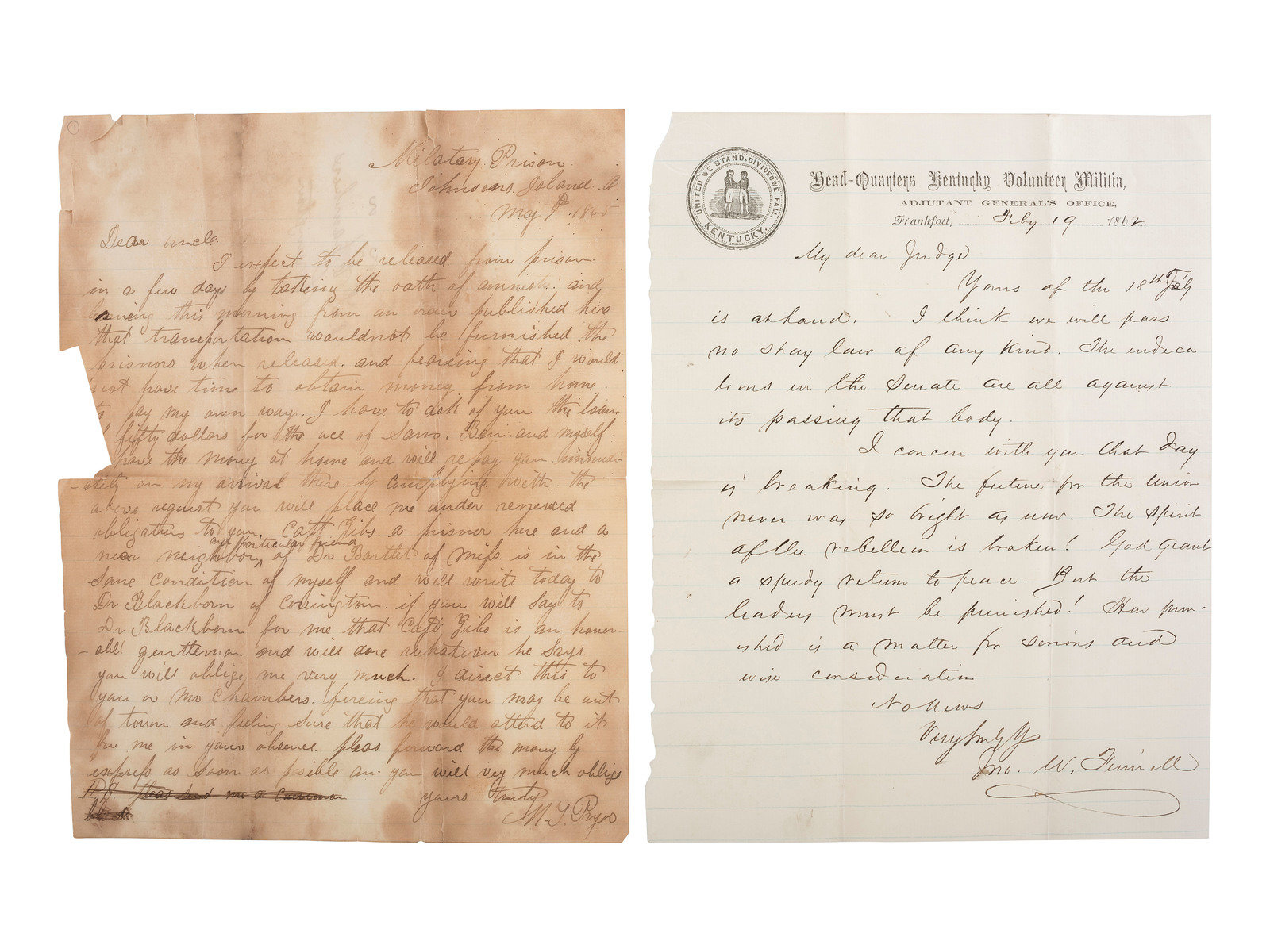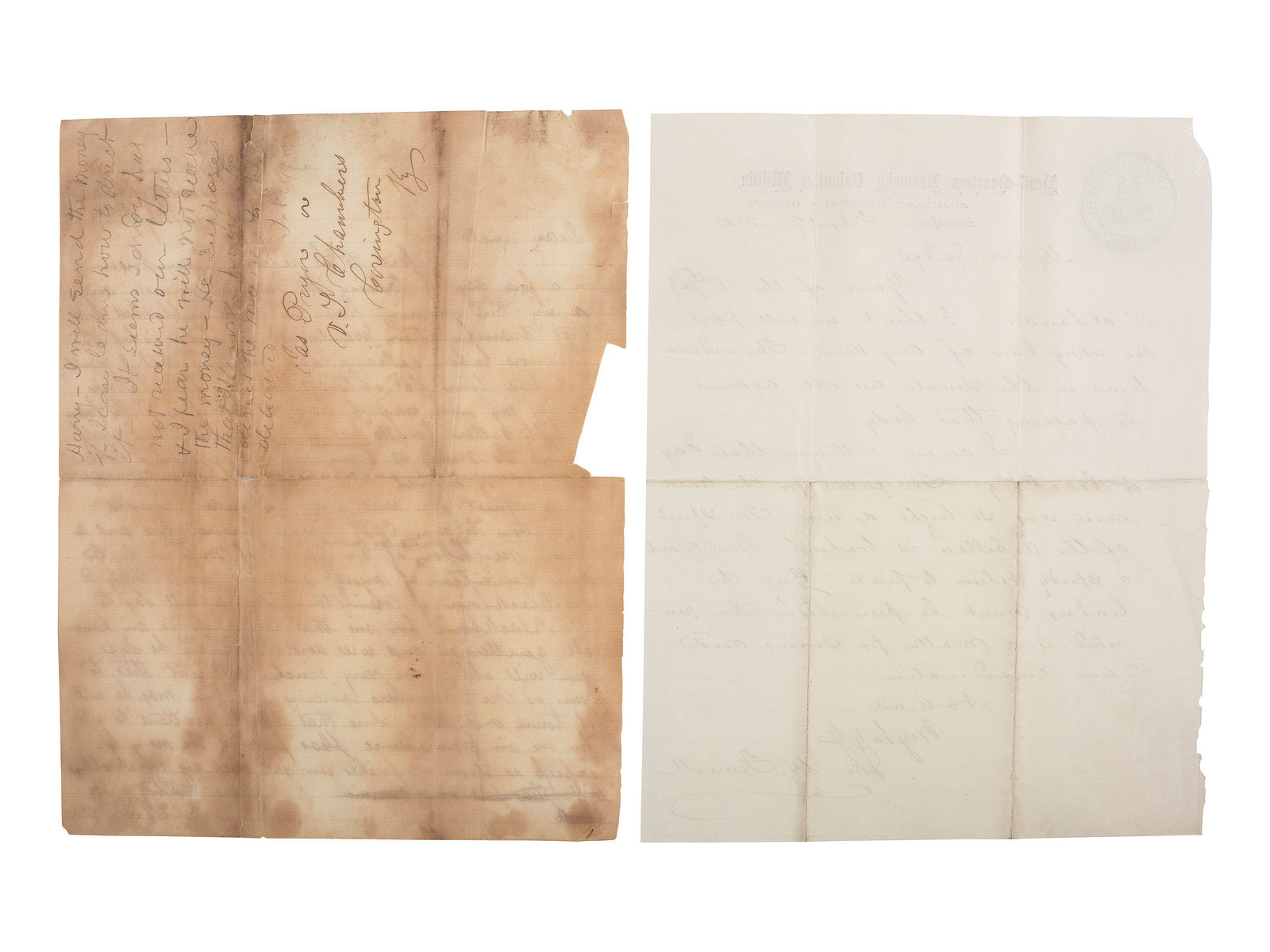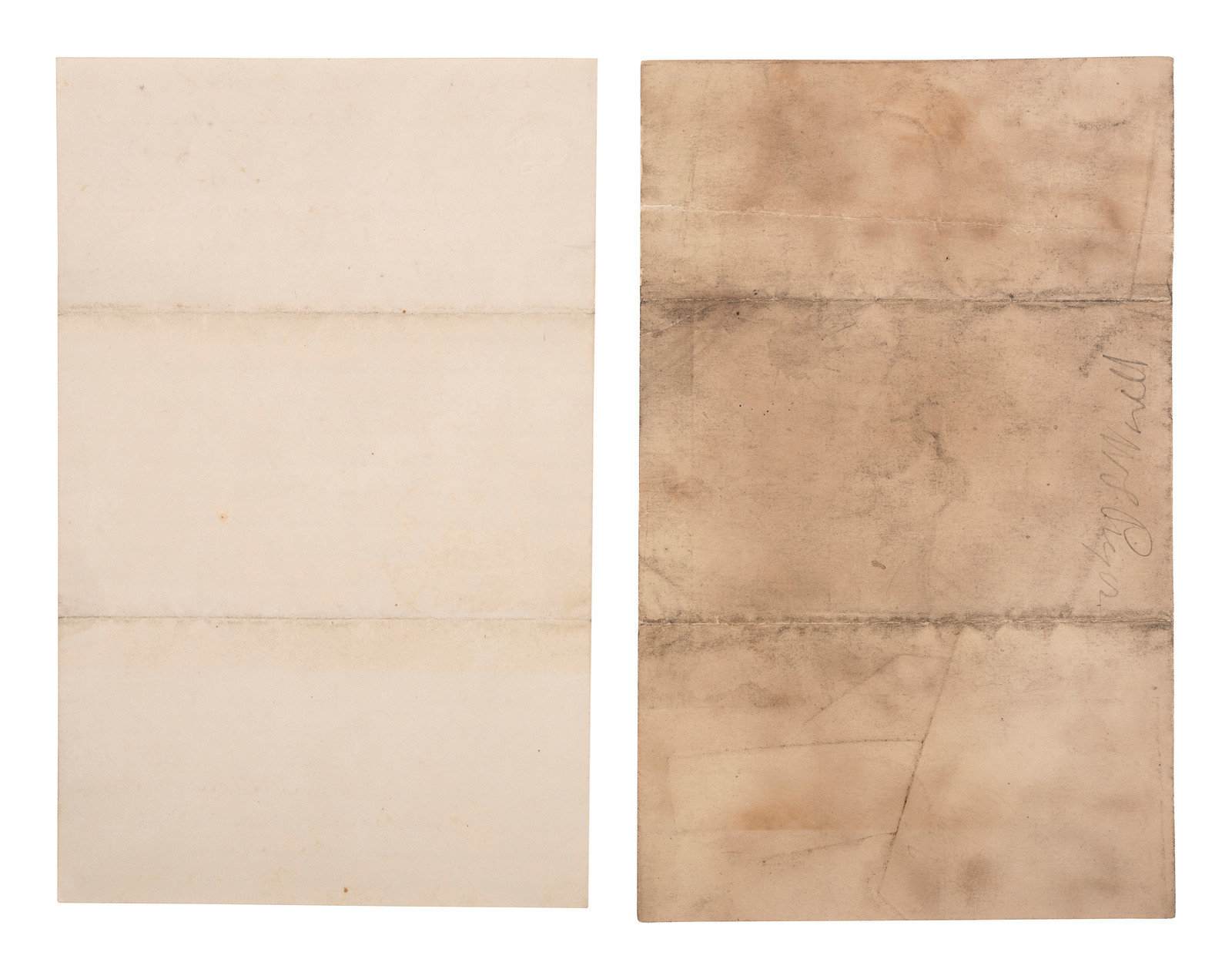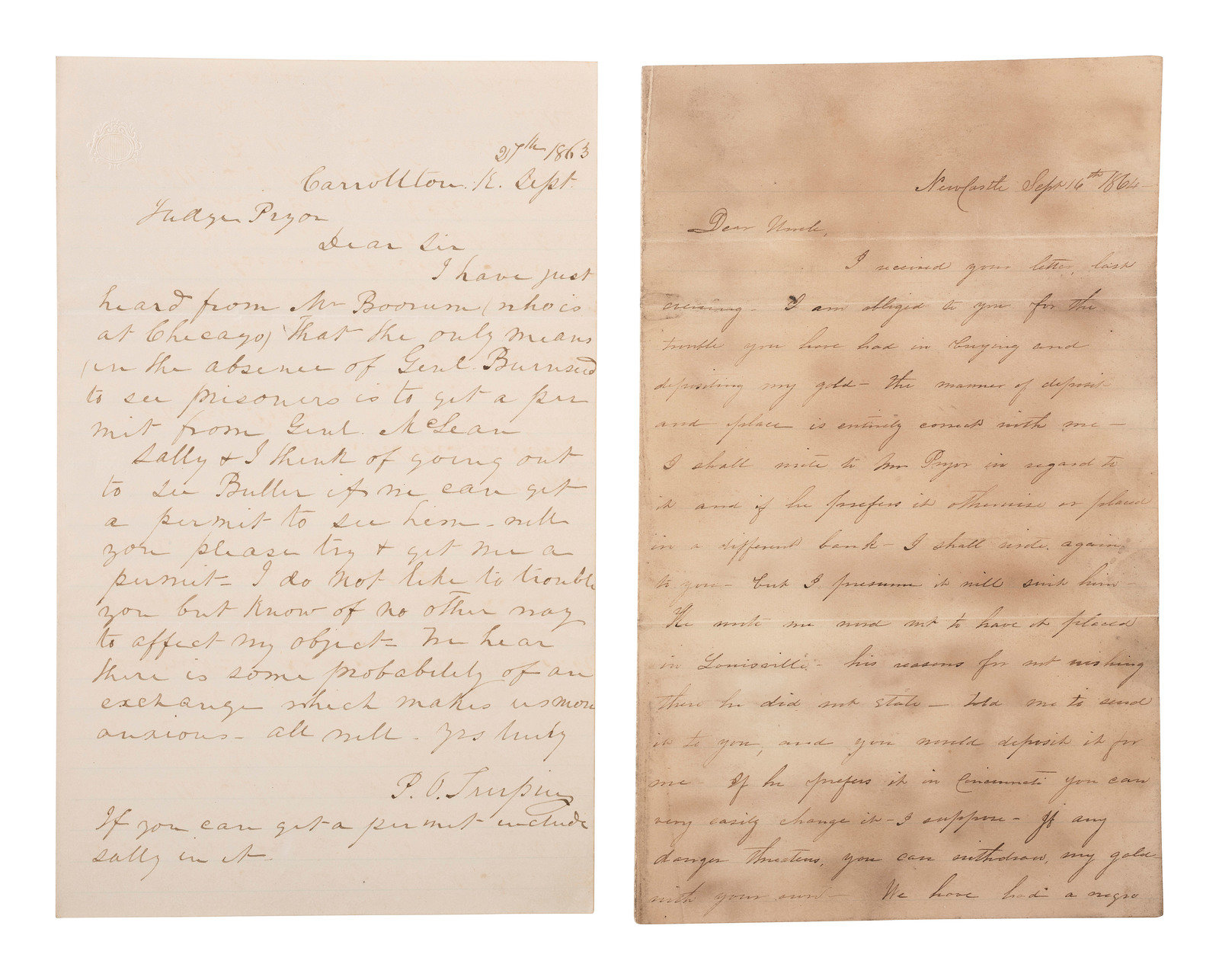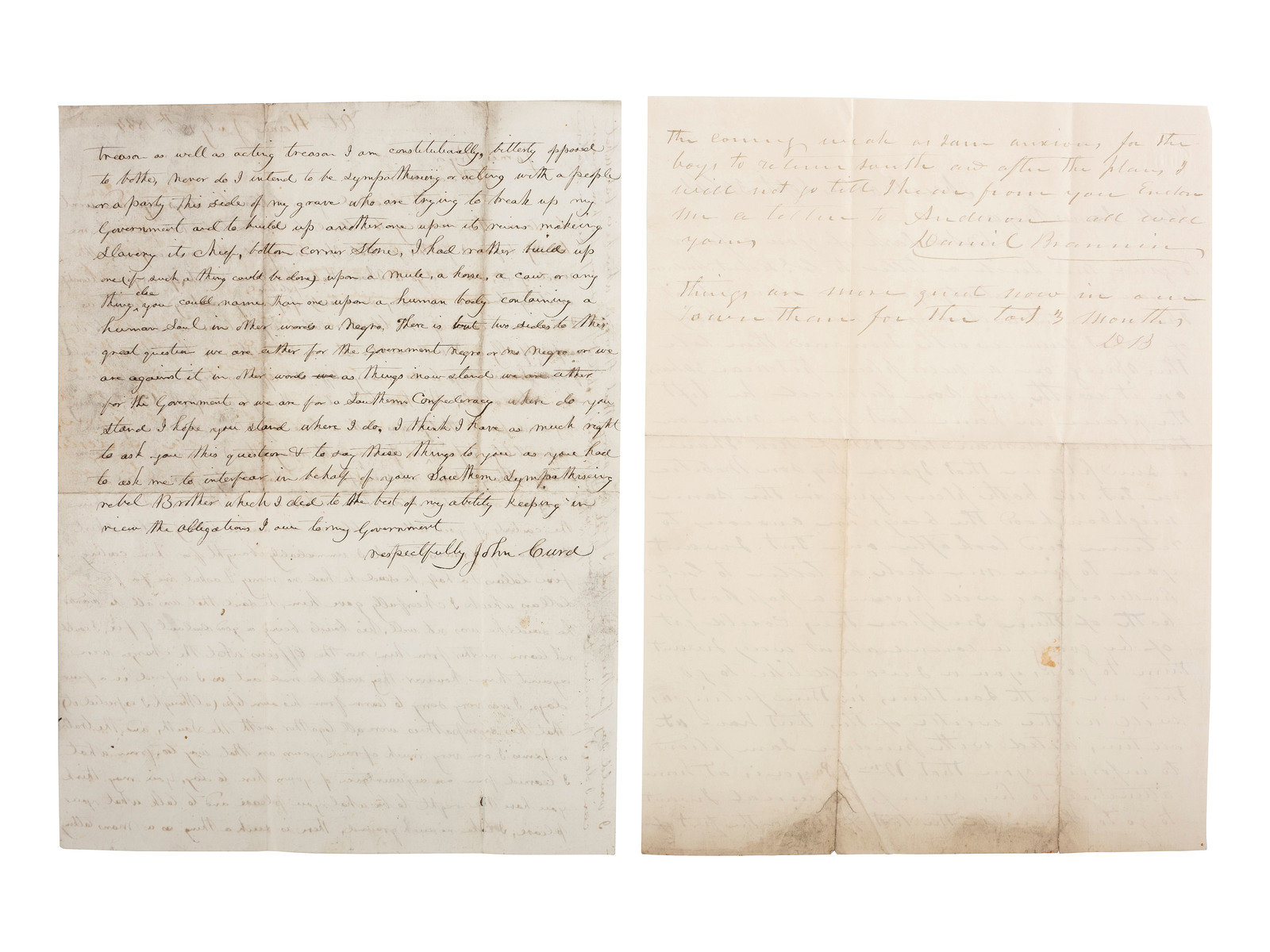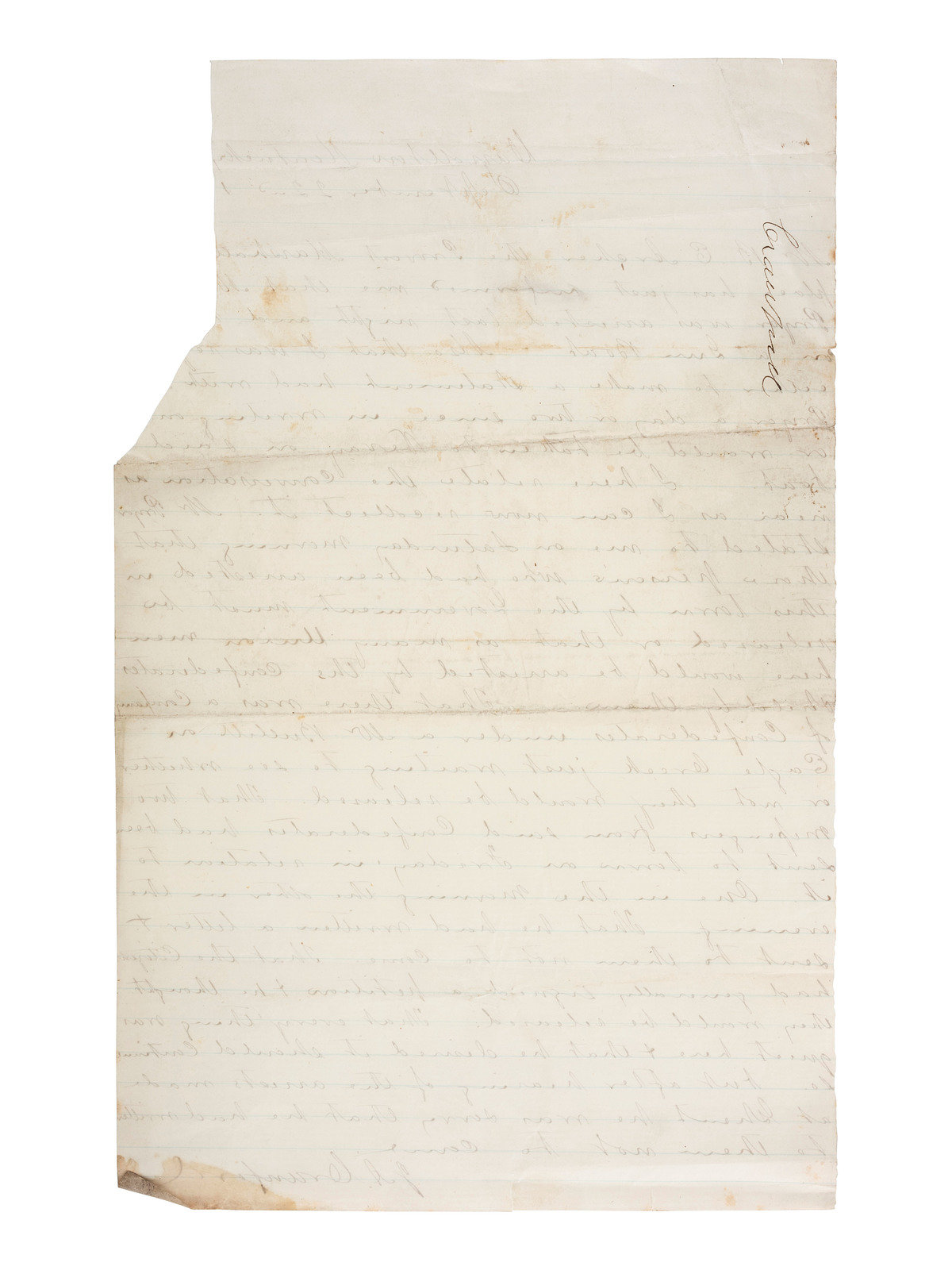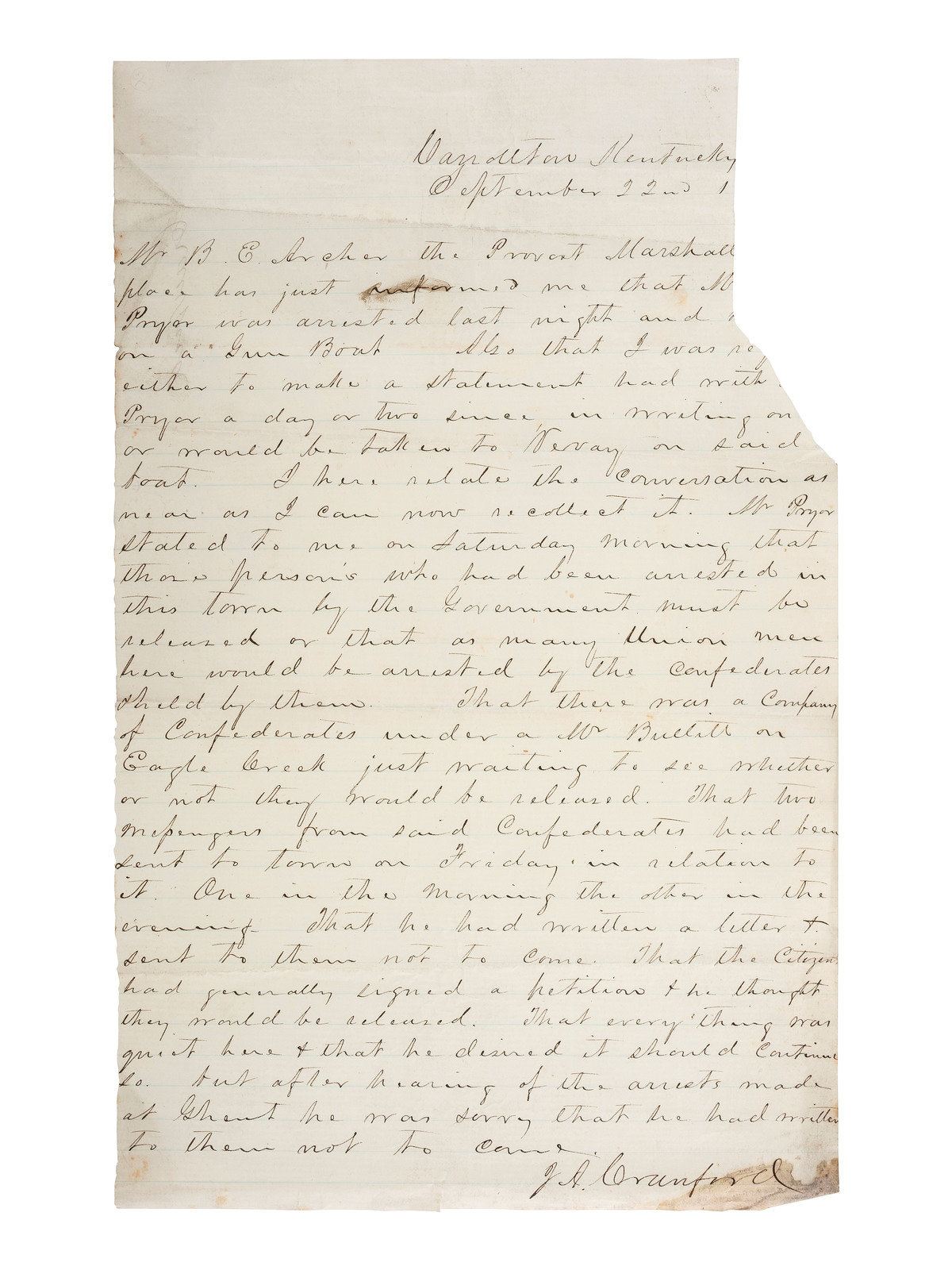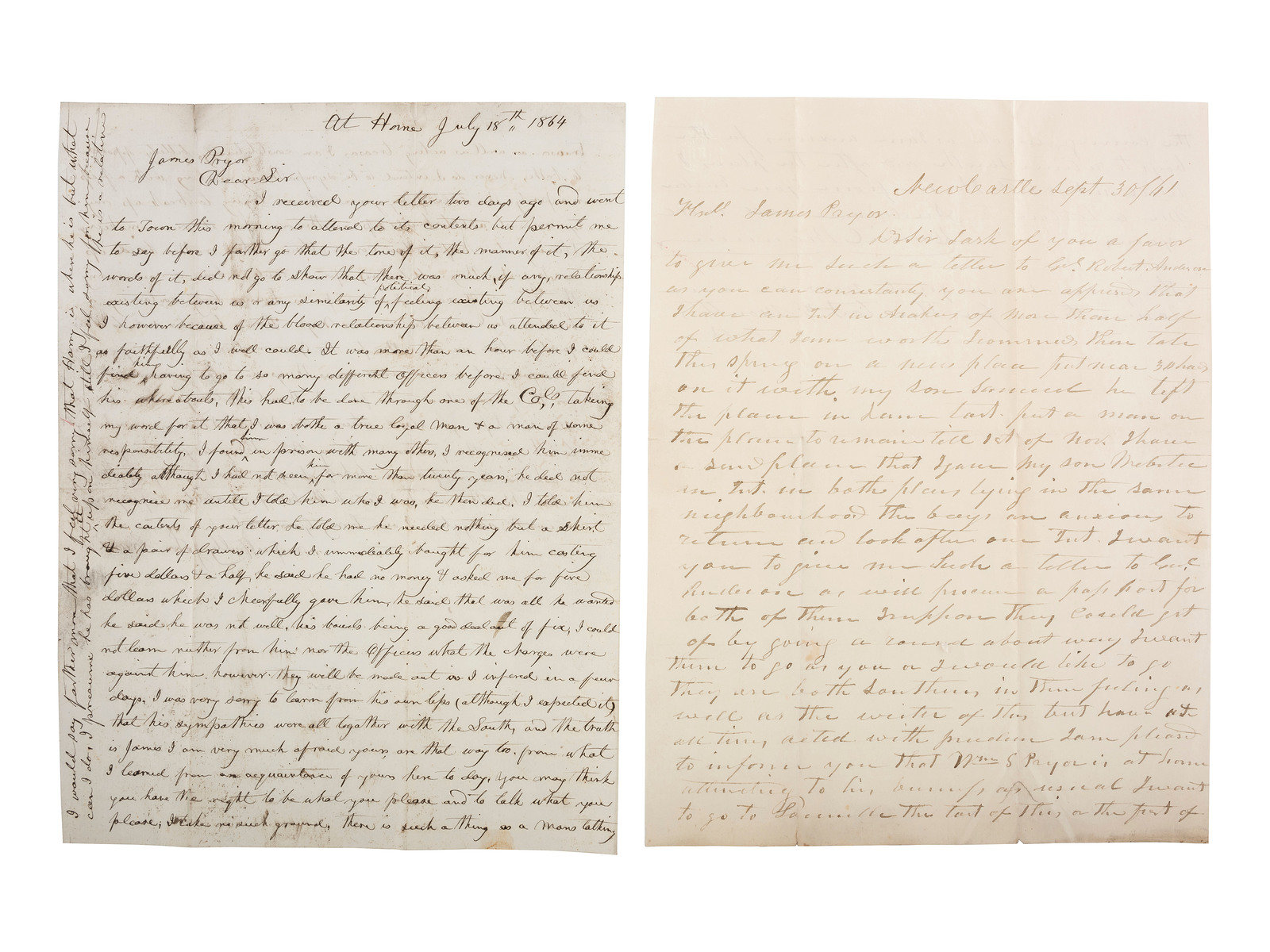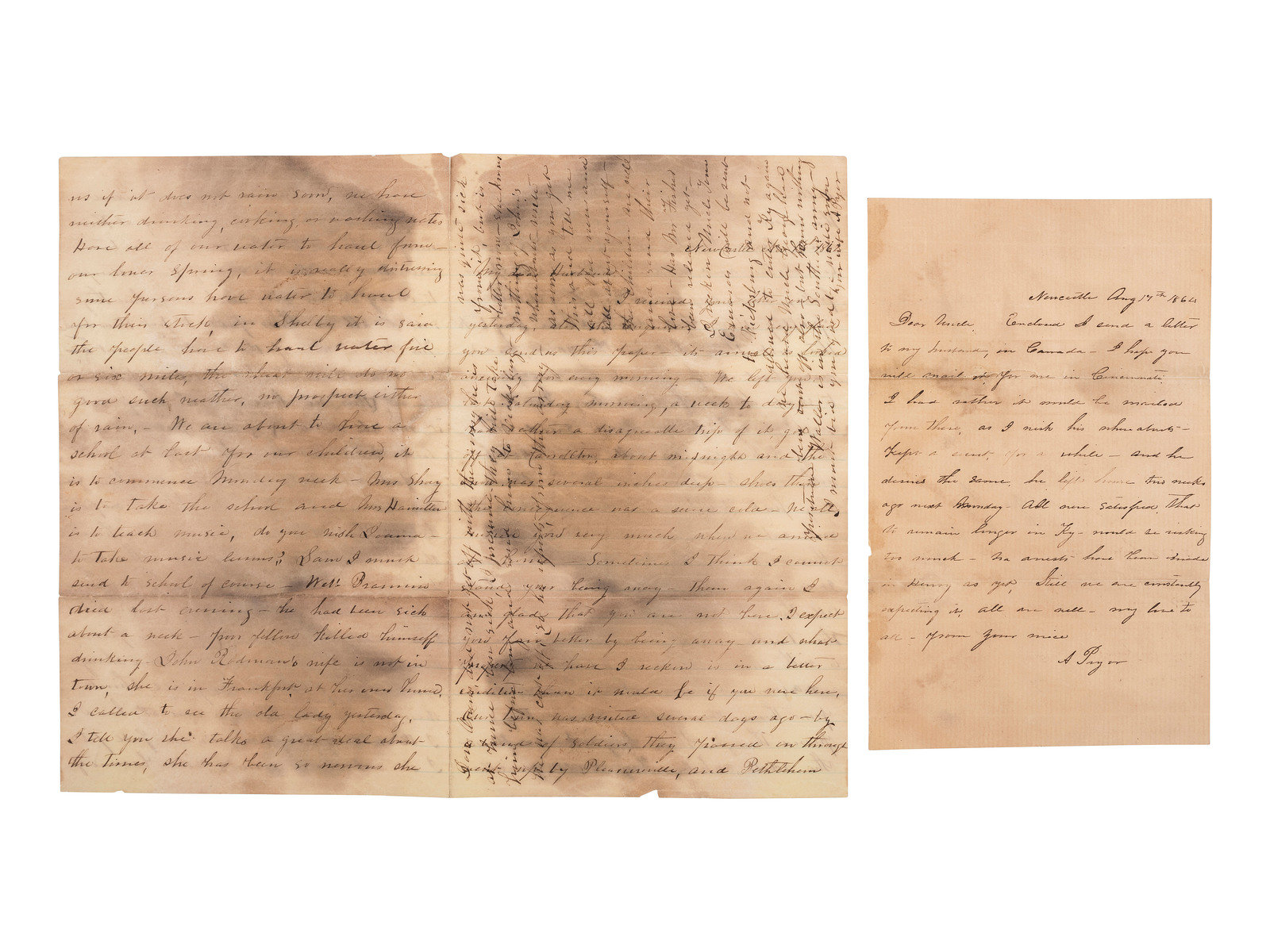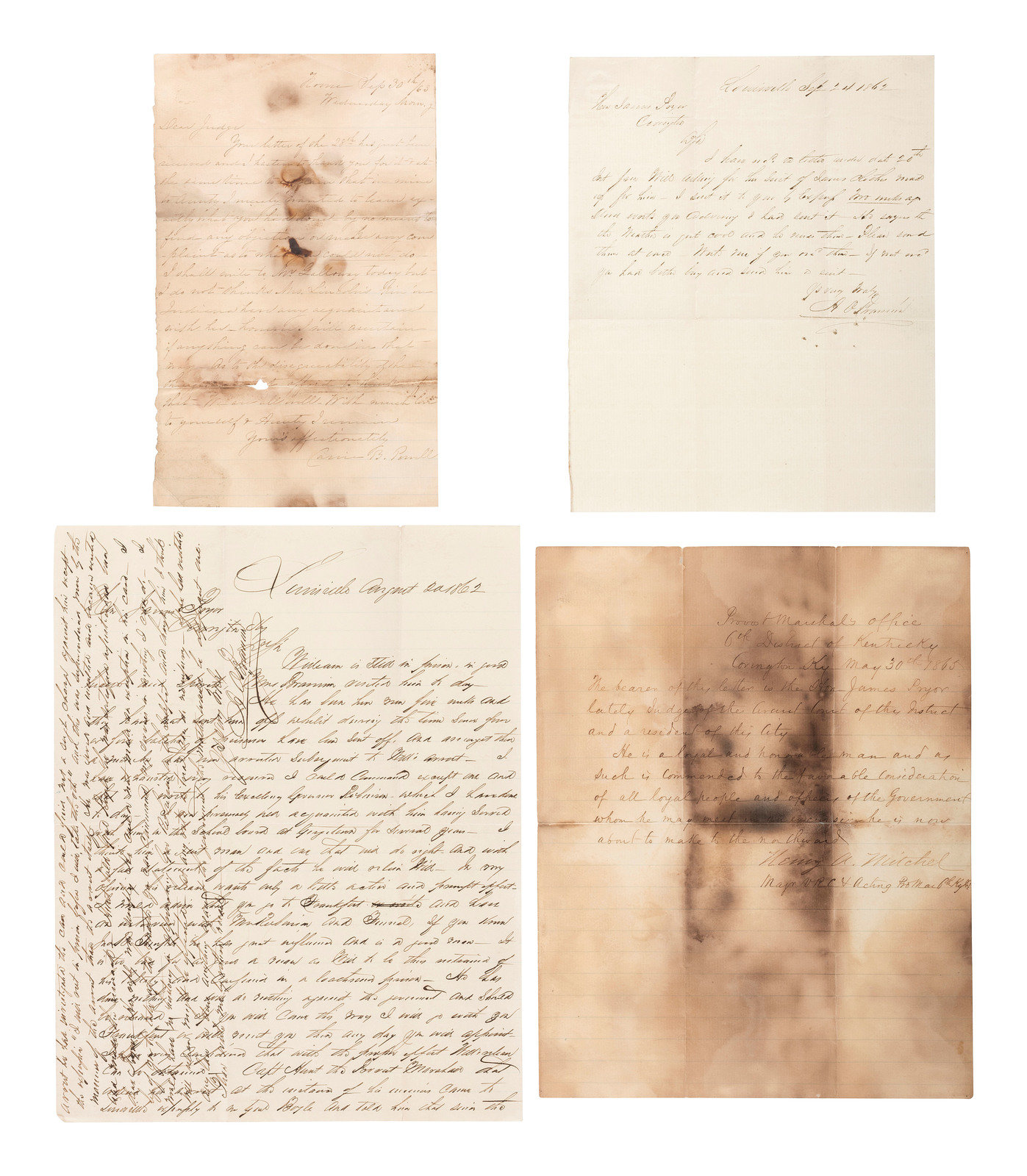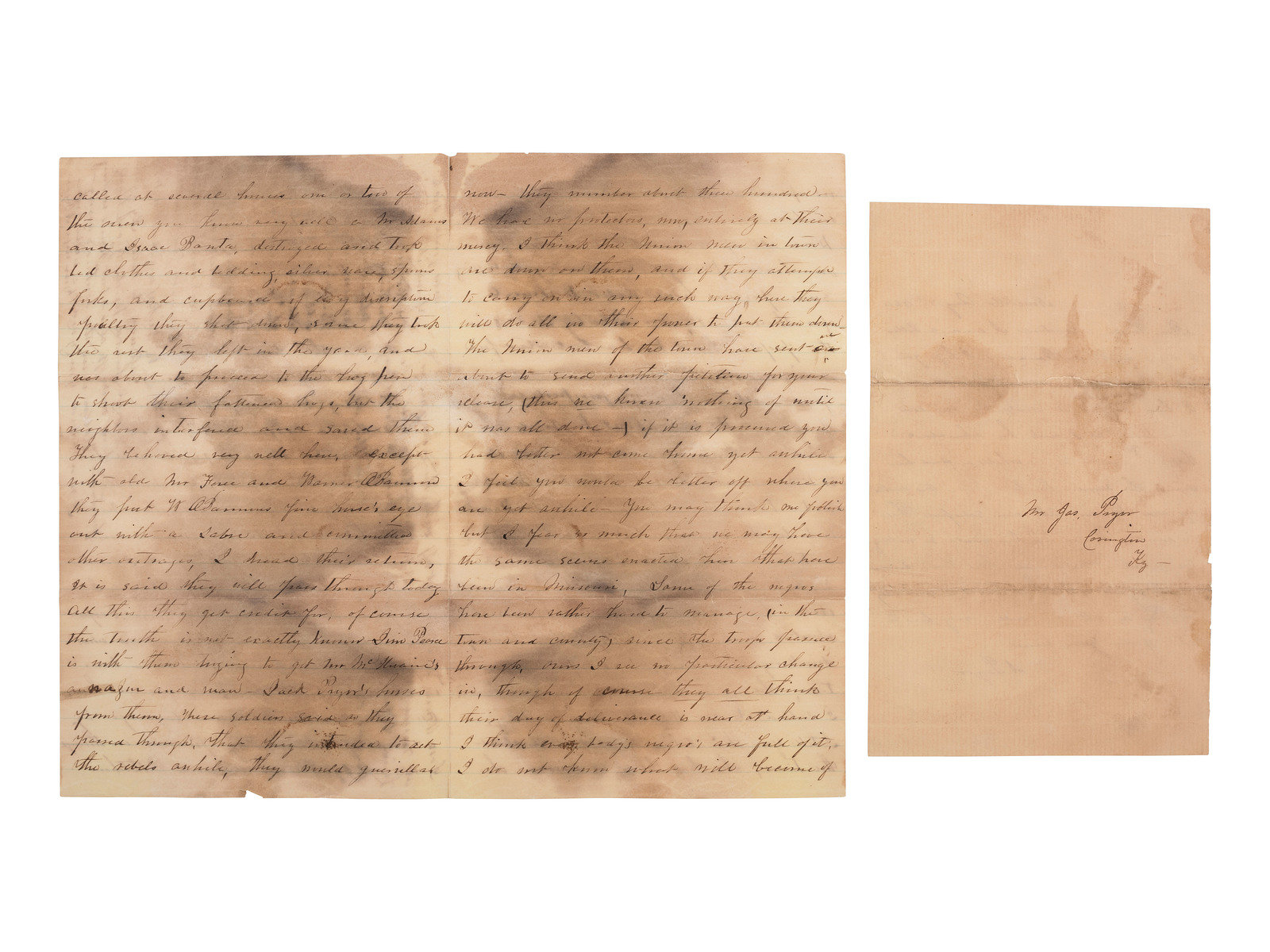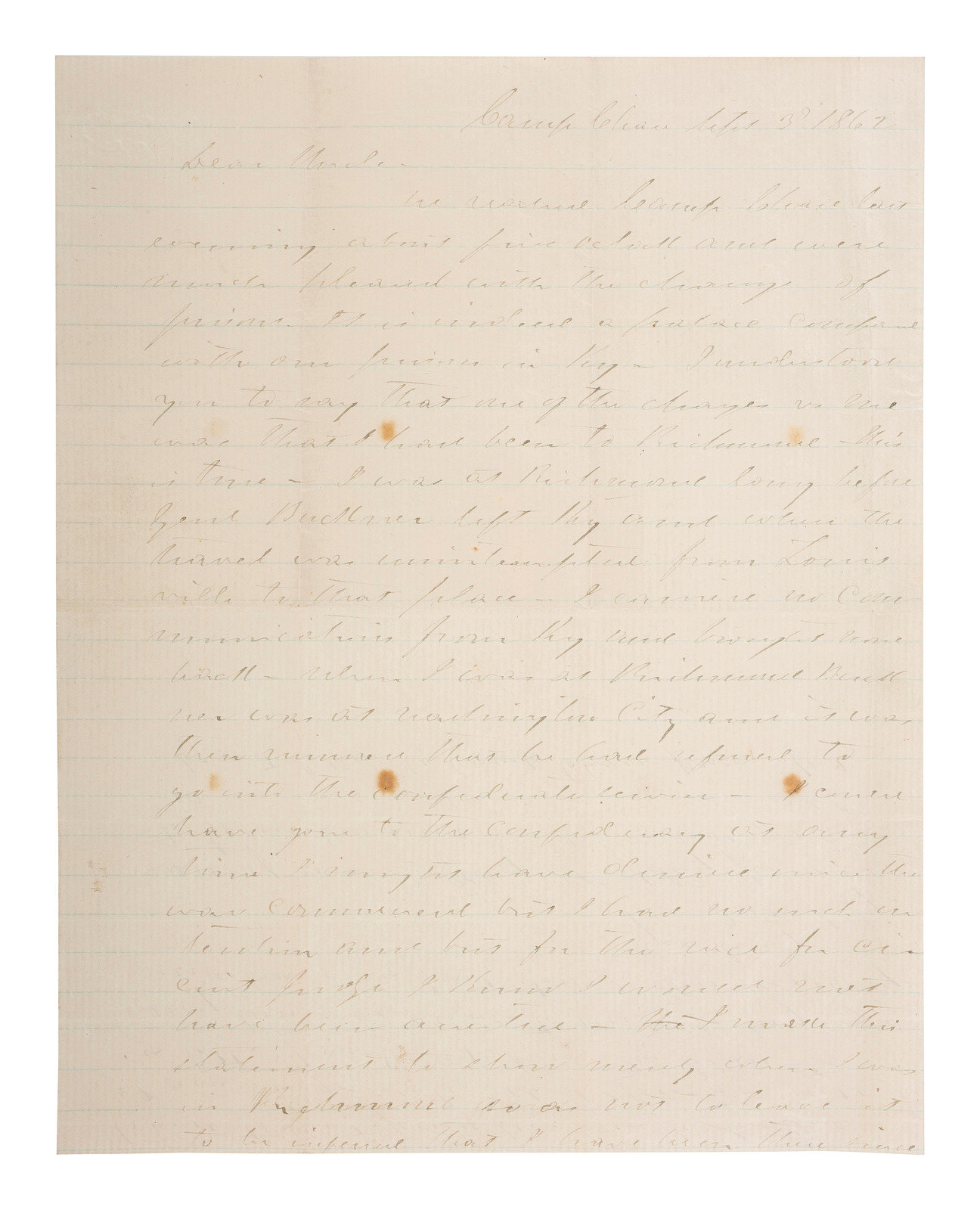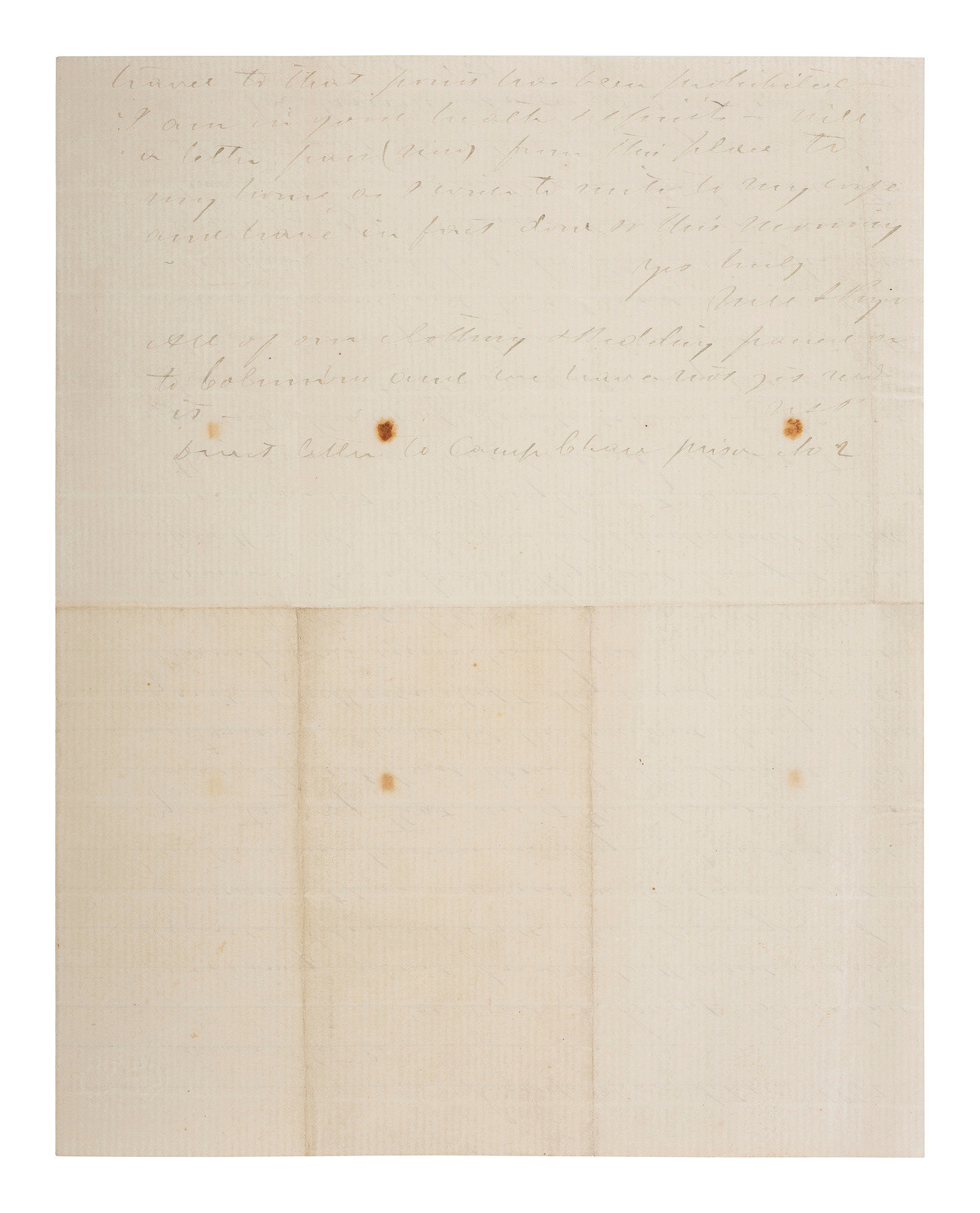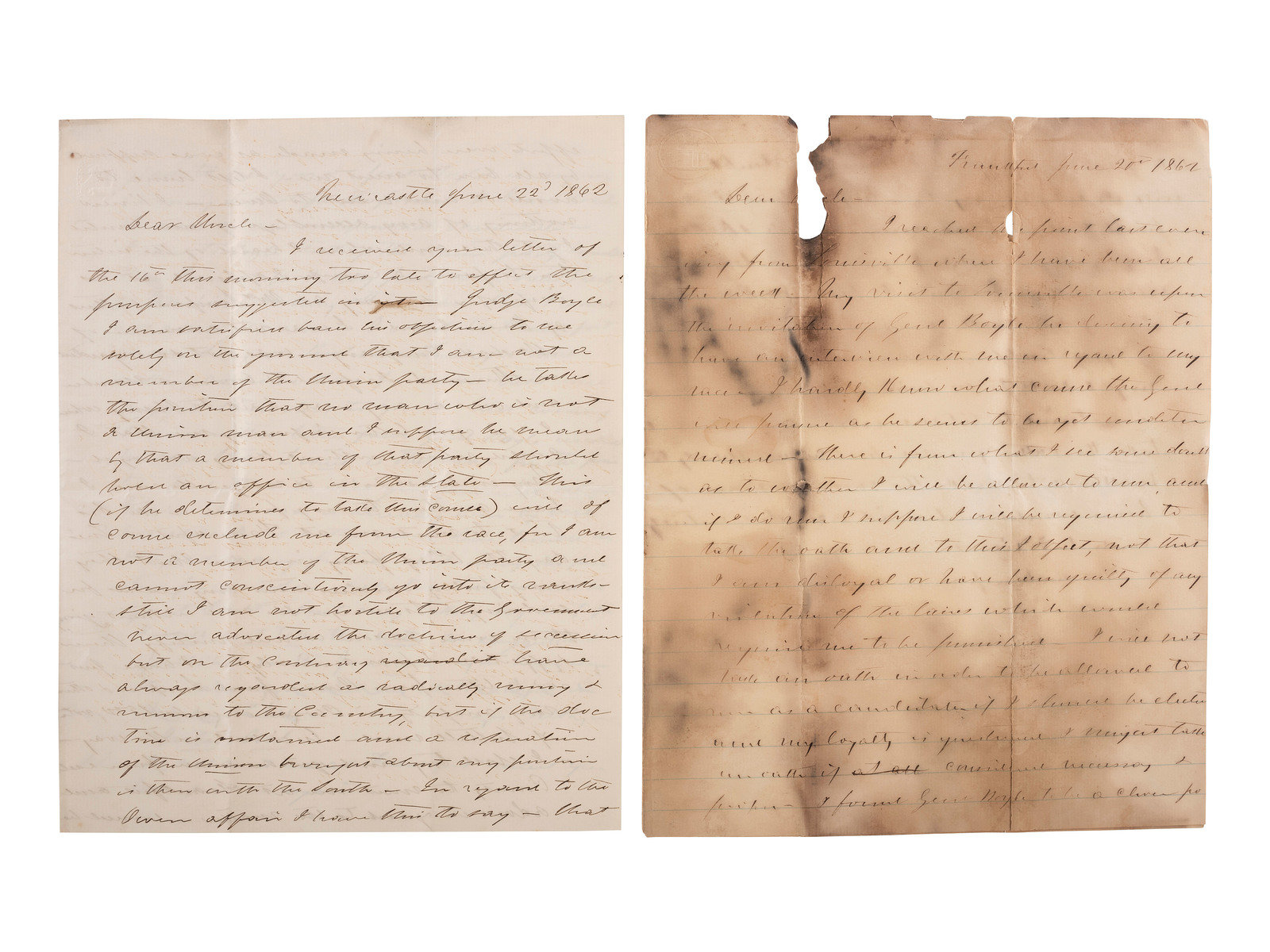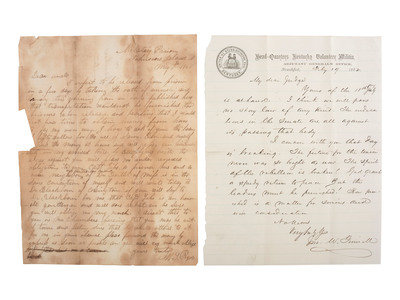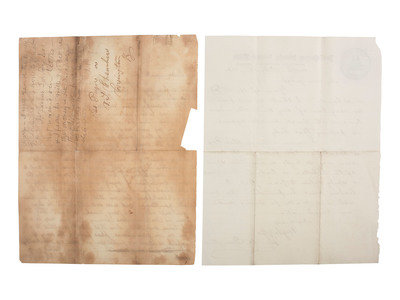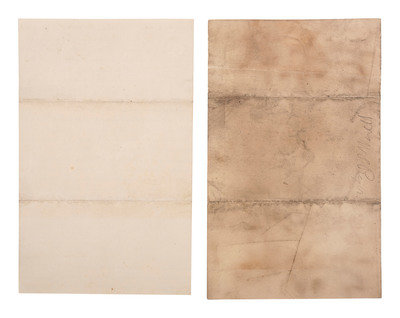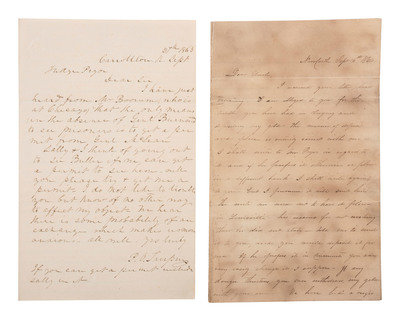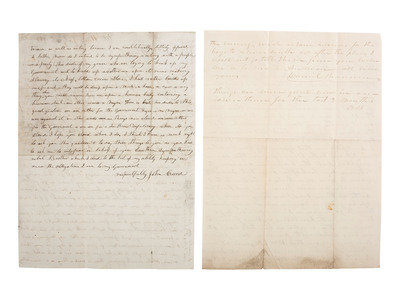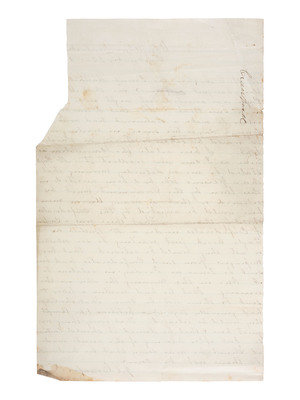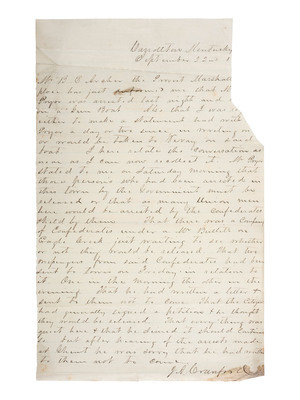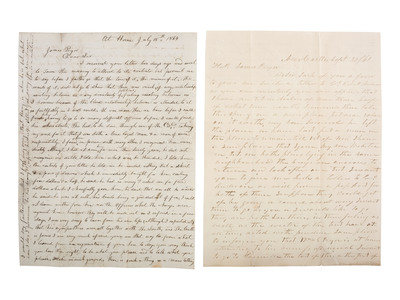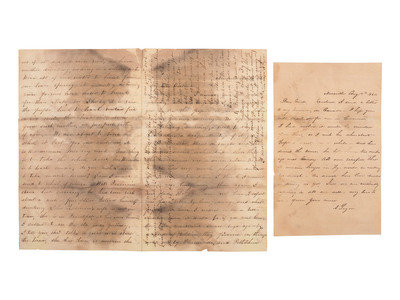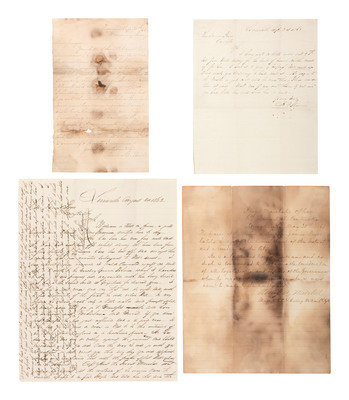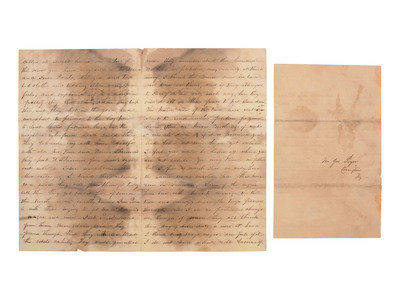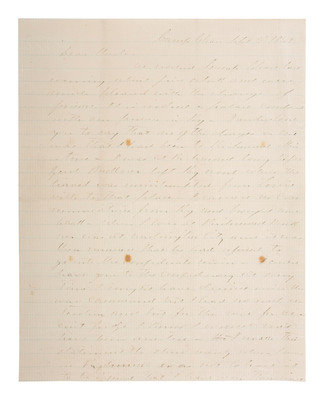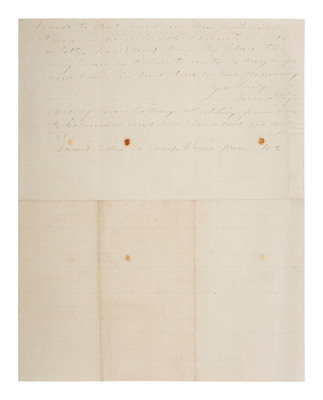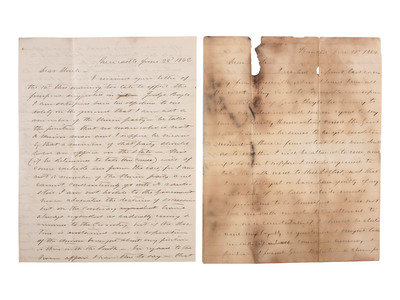[CIVIL WAR]. Archive of 16 letters to Judge James Pryor, including some from Judge William S. Pryor.
Sale 1005 - American Historical Ephemera & Photography
Lots Open
Mar 1, 2022
Lots Close
Mar 8, 2022
Timed Online / Cincinnati
Estimate
$400 -
$600
Sold for $2,000
Sold prices are inclusive of Buyer’s Premium
Lot Description
[CIVIL WAR]. Archive of 16 letters to Judge James Pryor, including some from Judge William S. Pryor.
Judge James Pryor (1802-1885) is a bit difficult to find. He seems to have been born in Henry County, the heart of “Pryor country.” But after obtaining his law degree, he set up residence/practice in northern Kentucky. We find him in both Carrollton and Covington, and possibly Louisville, as well. He married Caroline Butler in January 1847 and they had at least three daughters, listed in the 1850 census. The slave schedules indicate he had 9 enslaved persons in 1850. Although several of these letters suggest he had southern sympathies, he does not seem to have come out and strongly supported the Confederacy.
William Samuel Pryor (1825-1914) was the son of Samuel Pryor (1804-1833), one of James’ brothers. Samuel married Ann Marshall Samuel, a cousin of John Marshall (Supreme Court) and part of the Clark family of lawyers, explorers and generals. Besides his Uncle James, another Uncle (John) was also a Kentucky judge. Will grew up surrounded by legal practitioners, although his father was a simple farmer who served as county sheriff twice before his death. The circumstances surrounding Samuel’s death at the young age of 33 are unknown, though some suspect murder. This left a young family of a widow with five children in poverty. The large extended family helped, even paying for the education of some of the children. Will’s mother eventually remarried to Joseph Barbour, also a judge.
Will studied law with a couple of his uncles (including James). He passed the bar at 19 and a law had to be passed by the Kentucky legislature to allow him to practice before he turned 21. Will married Mary Brinker in 1848 and they had two children before Mary died in 1854. Will then married Apphia Beazley in 1856 and had ten children by her. She was the author of several of these letters.
War was clearly brewing by the late 1850s. Will was against it, and although he was too old to serve in the field by 1861, he did what he could to support the Southern cause. Kentucky remained technically Union, but a large portion of her population supported the Confederacy. One of Will’s contributions was to help Gen. John Hunt Morgan escape Yankee troops. Federal troops learned of this and had Pryor arrested. Uncle James Pryor knew the President and a member of the extended Prior family was married to Lincoln nephew. At least one of these letters seems to be a plea for Judge Pryor to use his connections to help Will.
In a letter sold in these rooms in August 2021 (Lot 43) a group of seven calling themselves “Union men” stated that William S. Pryor had been arrested but not charged with any crime, and thus was being held as a “political prisoner.” They swore that they knew him and he posed no danger to the Union. However, in multiple dockets, Union generals stated that Pryor had been in favor of secession at the beginning (he wasn’t) and “Obstinately refused” to take the oath of allegiance, something he does state in each of his letters. This apparently was enough for Stanton and others to keep him imprisoned. In another Apphia mentions the Union men sending another(?) letter to Washington in an effort to free what they saw as a “political prisoner.” She also notes that many in Henry County expect to be arrested at any time. Somehow Lincoln was convinced (and convinced Stanton) to allow Will to be on parole on weekends in Ohio, then eventually allowed him to go home on weekends to care for his family.
After one of Gen. Morgan’s more successful raids, some of the Yankees decided to go after the man who had helped him escape. Word got to Pryor who happened to be home on a weekend, and he himself escaped through Indiana and across the Detroit River into Canada, where he settled with other Southern expatriates. His family eventually joined him (not an easy journey with young children) and they returned to Henry County in 1866.
Shortly after his return he was appointed Circuit Court Judge. Three years later he was appointed as chief justice of the State Supreme Court (Court of Appeals in Kentucky) after the death of Chief Justice Robertson. He served for 26 years, ten of them as chief justice. But to hold this position, he had to be in Frankfort. He usually stayed there and went home on the weekends (much as he had as a prisoner!). When Democrats were all voted out of office in 1896 he originally thought he would retire, but instead opened a law office across the street from the Supreme court and tried cases from the other side of the bench. He died in 1914, one of the longest serving and most beloved judges in Kentucky.
ALS, Carrollton, Kentucky, Sept. 22, (date torn). 7-1/4 x 12in. (A piece approx. 1 x 4 in. torn from upper right.) Addressee uncertain. From J.A. Crawford (or Cranford?) According to part of the letter, “Mr. Pryor stated to me on Saturday morning that those persons who had been arrested in this town by the Government must be released or that as many Union men here would be arrested by the Confederates & held by them. That there was a company of Confederates under a Mr. Bullitt on Eagle Creek just waiting to see whether or not they would be released.”
ALS, Carrollton, Kentucky, Sept. 22, (date torn). 7-1/4 x 12in. (A piece approx. 1 x 4 in. torn from upper right.) Addressee uncertain. From J.A. Crawford (or Cranford?) According to part of the letter, “Mr. Pryor stated to me on Saturday morning that those persons who had been arrested in this town by the Government must be released or that as many Union men here would be arrested by the Confederates & held by them. That there was a company of Confederates under a Mr. Bullitt on Eagle Creek just waiting to see whether or not they would be released.”
ALS, New Castle, Sept. 30, 1861. 2pp, 7-1/2 x 10 in. Daniel Brannin to Hnbl. James Pryor. Asking Pryor to write a letter to Genl. Robert Anderson. He seems to be asking if Pryor can ask Anderson to send his son home, since the man hired to watch after his land is only scheduled to be there until 1 Nov. He also tells Pryor “…that Wm. S. Pryor is at home attending to his business….” Robert Anderson of Fort Sumter association was born near Louisville, KY and may have been known by Pryor.
ALS, Frankfort, 19 Feby 1862. On letterhead of Head-Quarters Kentucky Volunteer Militia, Adjutant General’s Office. Signed John. W. Finnell (1821-1888). Addressed “My dear Judge.” Regarding some legislation that will probably not pass the Senate. He then wonders about the state of the war. “The future for the Union never was so bright as now. The spirit of the rebellion is broken! God grant a speedy return to peace. But the leaders must be punished! How punished is a matter for serious and wise consideration.”
ALS, Louisville, August 20, 1862. 1pg. plus ca 1/3 page crisscrossed text, approx. 8-1/2 x 10-1/2 in. A. Brannin to James Pryor. Letter begins: “William is still in prison in good heart and spirits.” Most of the letter regards finding a way to get him released.
ANS, Louisville, Sept 24, 1862. 1pg, approx. 6-1/2 x 8 in. A. Brannin to James Pryor. Asking him to send the suit of clothes to Will that she sent him two weeks prior.
ALS, Carrollton, KY, Sept. 27th, 1863. 1pg., 4-3/8 x 7 in. To Judge (James) Pryor, from P.O. Turpin. He tells the judge that he and Sally (presume his wife) were thinking of going to see Lee Buller in prison but have found out that they need a permit to do so. Requesting that Pryor might be able to obtain such a permit for them.
ALS, ”Home” Sept. 30, 1863. Carrie B. Parrill (?) to Judge (James Pryor). 1pg. 5 x 8 in. Asking what he had done (presumably to free William), “…by no means to find any objections or make any complaint as to what you could now do…. I do not think Mrs. Lincoln’s kin in Indiana have any acquaintance with her – however I will ascertain if any thing can be done in that way….’ (several very dark stains near center of page)
ALS, “At Home” July 18, 1864. John Curd to James Pryor. 2pp, 7-1/2 x 10 in. “I received your letter two days ago and went to town this morning to attend to its contents, but permit me to say before I farther go that the tone of it, the manner of it, the words of it, did not go to show that there was much, if any, relationship existing between us or any similarity of political feeling existing between us. I however because of the blood relationship between us attended to it as faithfully as I well could.” He goes on to say that it took an hour to locate where the person in question was being held. “I could not learn neither from him nor the officers what the charges were against him, however they will be made out I inferred in a few days. I was very sorry to learn from his own lips (although I expected it) that his sympathies were all together with the South and the truth is James I am very much afraid yours are that way too…. Never do I intend to be sympathizing or acting with a people or a party this side of my grave who are trying to break up my Government and to build up another one upon its ruins making slavery its chief, bottom corner stone. I had rather build up one (if such a thing could be done) upon a mule, a horse, a cow or any thing else you could name than one upon a human body containing a human soul in other words a Negro….”
ALS, Milatary [sic] Prison, Johnson’s Island, O. May 9th, 1865. 1pg. M.T. Pryor to his Uncle (James Pryor – addressed on verso) “I expect to be released from prison in a few days by taking the oath of amnesty, and learning this morning from an order published here that transportation wouldnot be furnished the prisnors [sic] when released, and fearing that I would not have time to obtain money from home to pay my own way, I have to ask of you the loan of fifty dollars for the uce [sic] of Sam[e].” He goes on to say that another prisoner there was going to write to an acquaintance in Covington [KY] for the same purpose and asks his uncle to tell this person that the prisoner is an honorable gentleman and will repay the loan. (small chip torn from left edge, but present; several areas of darkening)
Manuscript document, Provost Marshals Office, 6th District of Kentucky, Covington, KY. May 30th 1865. 7-3/4 x 9-3/4 in. “The bearer of this letter is the Hon. James Prior lately Judge of the Circuit Court of the district and a resident of this city. / He is a loyal and honorable man and as such is commended to the favorable consideration of all loyal people and officers of the government….” (very dark area in center, lighter darkening elsewhere)
Apphia Pryor to James Pryor
ALS, New Castle, Nov. 15, 1862. 4pp (plus some crisscrossed lines), 5 x 8 in. Addressed to husband, signed A. Pryor – likely Apphia Pryor, wife of William Samuel Pryor (1825-1914), judge of the appellate court. “Sometimes I cannot stand your being away. Then again I am glad that you are not here. I expect you fair [sic] better by being away and what property we have I reckon is in a better condition than it would be if you were here. …The Union men of the town have sent or are about to send another petition for your release (this we knew nothing of until it was all done)… Some of the negros have been rather hard to manage (in the town and country) since the troops passed through, ours I see no particular change in, though of course they all think their day of deliverance is near at hand. I think every body’s negro’s are full of it…. “ Much more ranging from news of various residents of the town to the drought and water shortage. (See Lot 43 of Hindman American Historical Ephemera & Photography sale August 20, 2021 for more on Judge Pryor’s arrest)
ANS, New Castle, Aug. 17, 1864. 1pg, 4-3/8 x 7 in. A. (Apphia) Pryor to James Pryor. “Enclosed I send a letter to my husband in Canada. I hope you will mail it for me in Cincinnati. I had rather it would be mailed from there, as I wish his whereabouts kept a secret for a while – and he desires the same. He left home two weeks ago next Monday. All were satisfied that he remains longer in Ky. would be risking too much. No arrests have been made in Henry [county] as yet. Still we are constantly expecting it. …”
ALS, New Castle, Sept. 16, 1864. 2pp, 4-3/8 x 7 in. “Dear Uncle” (probably James Pryor) from A. Pryor. Regarding a deposit (of gold?) in a bank in Cincinnati rather than Louisville. He then goes on to say “We have had a negro regiment encamped upon Joe Brinker’s (?) farm joining our own. They remained here three or four days. Recruiting was quite brisk….in some cases every negro man left their owners. Our negros are still at home but I think they all intend to leave shortly. They seem restless.” (overall irregular darkening)
Will S. Pryor to James Pryor
ALS, Frankfort(?), June 20, 1862. 2pp, 8 x 10 in. Will S. Pryor to Uncle. This letter with extensive scorching and charring. He seems to be wondering if he can run for office and if so, will he be required to take the oath of allegiance. Kentucky was not part of the Confederacy, but many Kentuckians (apparently including some of Mrs. Lincoln’s kin) supported the Southern cause.
ALS, New Castle, June 22, 1862. Will S. Pryor to Uncle, 3pp, 7-3/4 x 9-3/4 in. Will Pryor to Uncle. Judge Boyle objects to Will running for office “…solely on the grounds that I am not a member of the Union party…. I am not hostile to the government, never advocated the doctrine of secession but on the contrary have always regarded as radically running(?)….” Most has to do with whether or not he will be able to run. “I will not take the oath as suggested…”
ALS, Camp Chase, Sept 3, 1862. 2pp, 7-1/4 x 9-1/4 in. Will S. Pryor to Uncle (James Pryor) Very light and difficult to read. Will says they returned to Camp Chase the previous evening and were moved to a new prison (No. 2). Something seems to have happened to their clothing and bedding in the process.
Condition Report
The physical condition of lots in our auctions can vary due to
age, normal wear and tear, previous damage, and
restoration/repair. All lots are sold "AS IS," in the condition
they are in at the time of the auction, and we and the seller make
no representation or warranty and assume no liability of any kind
as to a lot's condition. Any reference to condition in a catalogue
description or a condition report shall not amount to a full
accounting of condition. Condition reports prepared by Hindman
staff are provided as a convenience and may be requested from the
Department prior to bidding.
The absence of a posted condition report on the Hindman website or
in our catalogues should not be interpreted as commentary on an
item's condition. Prospective buyers are responsible for
inspecting a lot or sending their agent or conservator to inspect
the lot on their behalf, and for ensuring that they have
requested, received and understood any condition report provided
by Hindman.
Please email conditionreports@hindmanauctions.com for any additional information or questions you may have regarding this lot.
